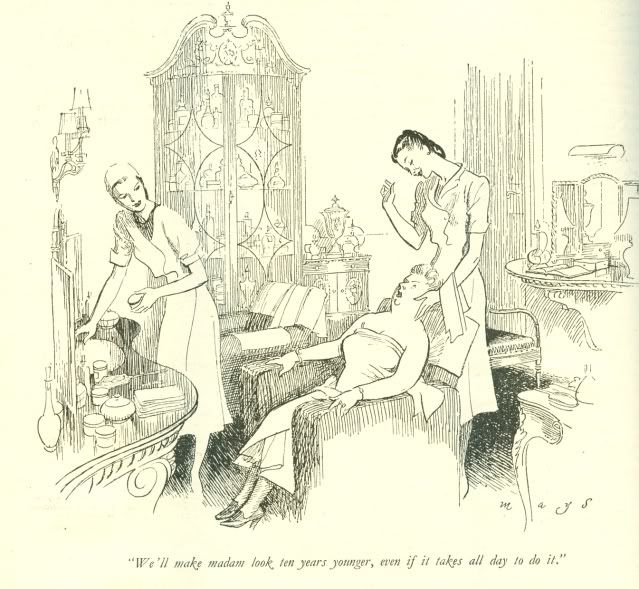
1949: Could have been Expressed More Diplomatically
The customer has noticed the gaffe even if the beauticians have not.

1949: Could have been Expressed More Diplomatically
The customer has noticed the gaffe even if the beauticians have not.
These are getting more and more giggle-worthy.
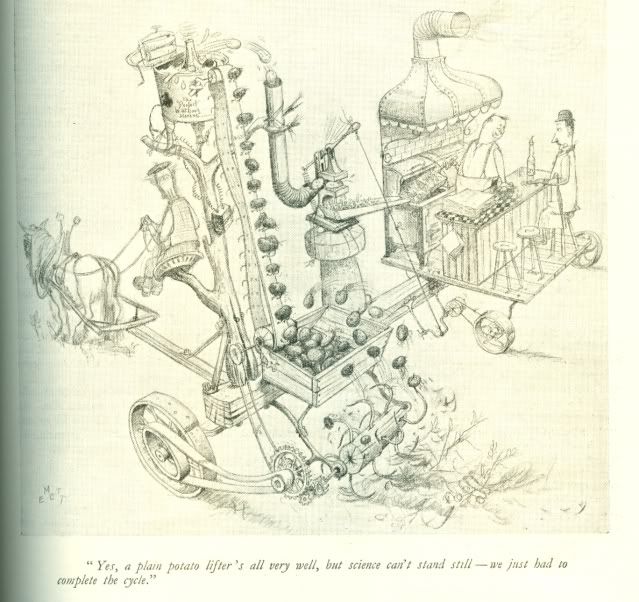
1949: From Potato Field to Chip Shop
Emett has taken his cue from the combine harvester – and taken it to its illogical conclusion.
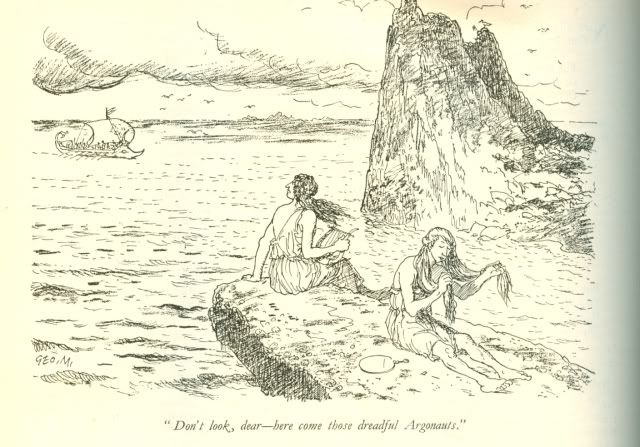
1949: Homer Brought Up-to-date
This artist’s standard technique is to place modern ideas into a context taken from history or literature. In this cartoon we are shown a modern ‘take’ on an episode in the Odyssey.
One of the many perils encountered by the crew of the Argo was that of the sirens who lured sailors to the deaths by persuading them to sail onto rocks. Here these sirens don’t want to do what they are meant to do. Instead one of them is referring to them as though she is a sixth former at a posh Girls’ Grammar School who has been told not to talk to those common boys from the local Secondary Modern.
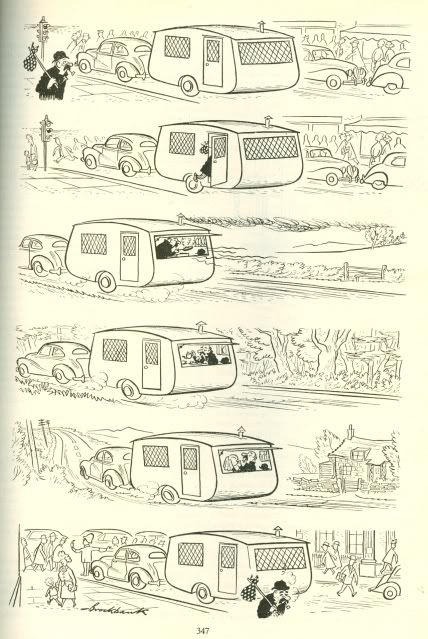
1949: The Almost Perfect Uninvited Guest
Without a caption or any text the artist uses a well-executed series of drawings to let the pictures tell their story entertainingly.
The tramp is well mannered. Yes, he helps himself to a meal that doesn’t belong to him. On the other hand, he washes up after his fry up and closes the curtains before alighting at a traffic hold-up.
The car towing the caravan looks as though it might be a Morris Minor, which would be correct for 1949.
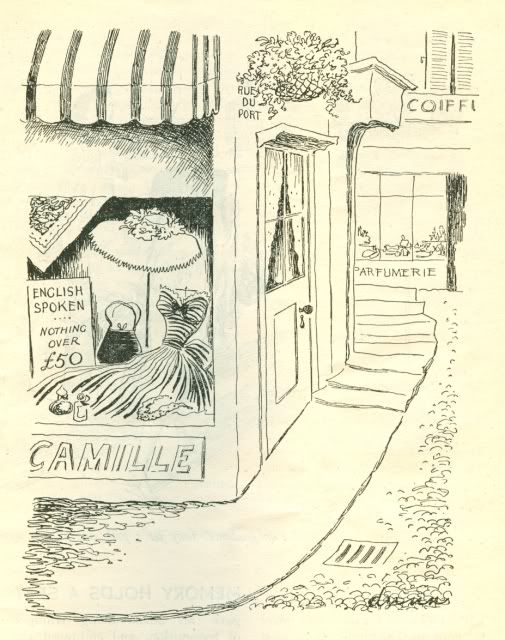
1949: Balance of Payments
Punch readers in 1949 no doubt were very exercised about the £50 maximum that they were allowed to take out of the country when going abroad for their holidays. This cartoon is a testament to the attraction of the exotic things that were available across the Channel – and to the difficulty of obtaining them.
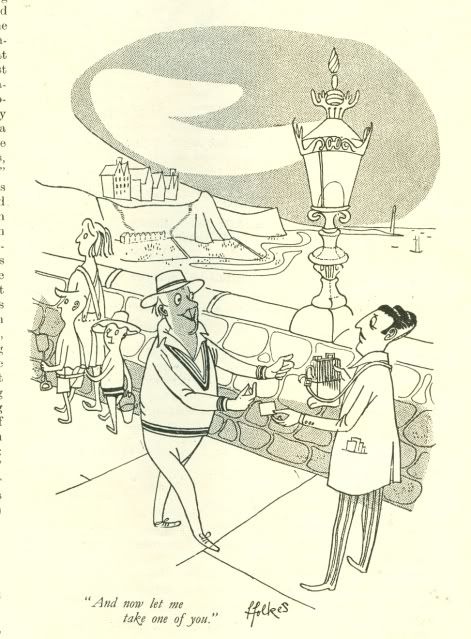
1949: Seaside Encounter
The naive elderly gent is quite unaware of the commercial intent of the man who has just taken his photograph.
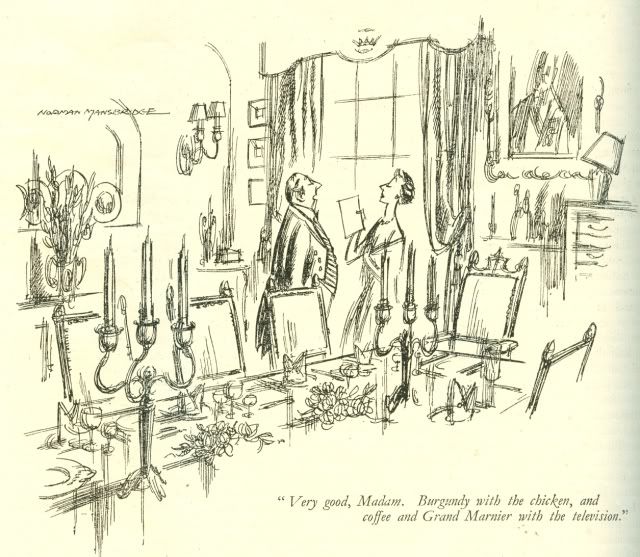
1949: Intrusion of TV
In the early 1930s there were some, though not many, jokes about the super-rich. Now, in 1949, we get only the one. This will not be a matter of chance. The super rich still survived but they had largely moved out of the ken of the readers of Punch.
Here the butler is making sure that he has correctly summarised Madame’s orders for what is to be served with which course. The innovation is that the dinner party will take coffee and Grand Marnier with television. Perhaps there would be really something worth watching. It didn’t happen all that often. The potter’s wheel wouldn’t fit the bill.
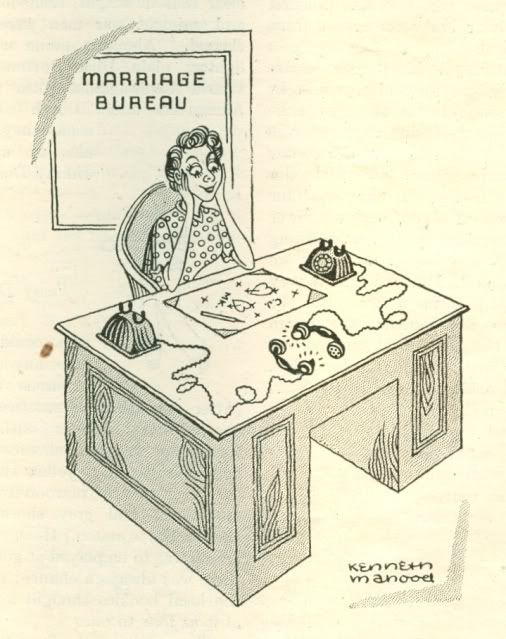
1949: Matchmaking Without Ultra Modern Technology
The romantically inclined lady at the marriage bureau is charmed that her efforts have been successful. In reality I fear that she would be much more hard-boiled than that reflecting that on this occasion, at least, she would not need to try once again to shift some awkward character off her books.
The cartoon reminds us how things have changed in this area. Dating sites now abound to say nothing of speed-dating. There is no longer any need to join (say) a pottery class in the hope of finding a like-minded partner.
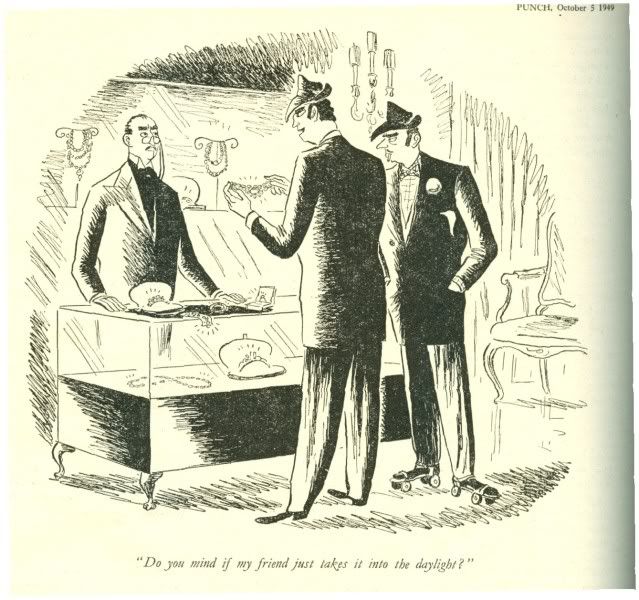
1949: Light Larceny
I was around in 1949 and read the papers assiduously. I do recall the era of spivs (though I don’t remember the triangular hats with which Anton always drew them). I associate the spivs with selling objects in short supply – which had ‘just dropped off the back of a lorry’. I don’t associate their activities with daylight robbery but I can well imagine that Anton was much better informed than I was.
If there was any doubt about what the pair is up to one has only to look at feet of the spiv on the right of the drawing.
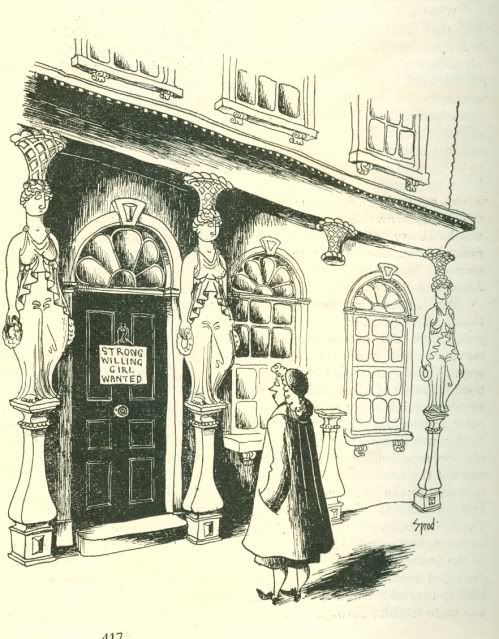
1949: An Architectural Joke
Of course this job applicant isn’t really going to help hold up the plinth on top of her head wearing only her nightie. The other figures now doing the job were called caryatids in Ancient Greece. In the early years of the Nineteenth Century fashion-conscious architects were very much inclined to borrow features like this from Classical Antiquity.
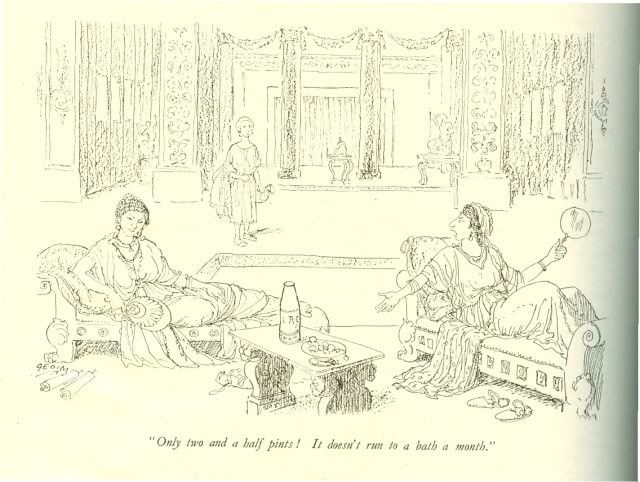
1949: Rationing Again
I am assuming that two and half pints was then the weekly milk ration per person. Cleopatra didn’t really have to cope with such privations.
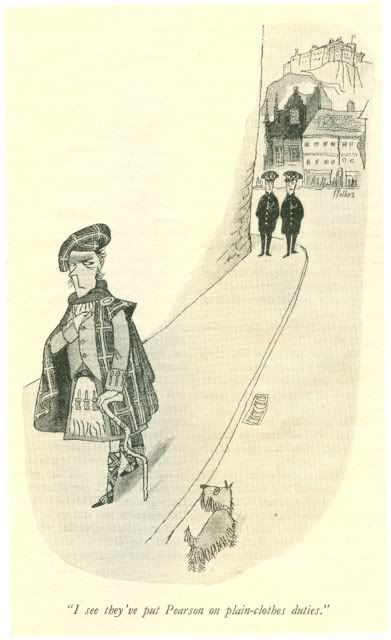
1949: Plain Clothes in Scotland
Pearson is on the beat within sight of Edinburgh Castle. I wouldn’t have thought that this was an anti-Scottish joke. On the contrary, it asserts that the kilt is the normal attire for a Scot.
Of course, an Englishman would say the Pearson isn’t wearing ‘plain clothes’ at all. But that shows how little the English know.
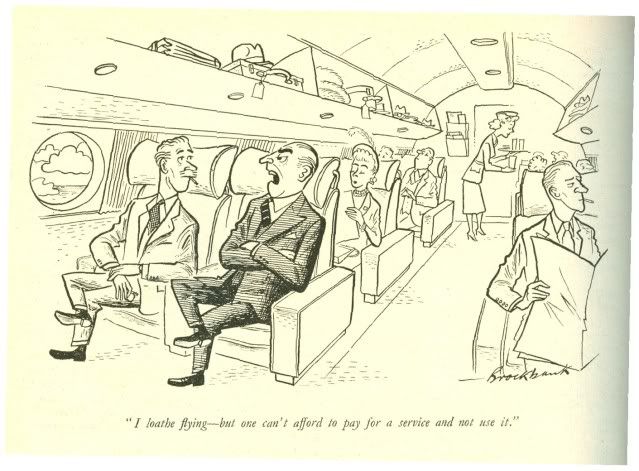
1949: How They Flew Then
This is intended to be a joke about how the British Government was subsidising the UK’s airlines, BEA and BOAC.
For us though there is the additional interest in seeing how people flew then. It was definitely meant for the few, not for the many. To us it all looks so civilised. There are the armchairs with the generous legroom. The overhead compartments are not shut during the flight. There don’t seem to be any seat belts. The stewardess looks more homely than glamorous.
What was there to ‘hate’ about flying? They even got boiled sweets on take-off and landing!
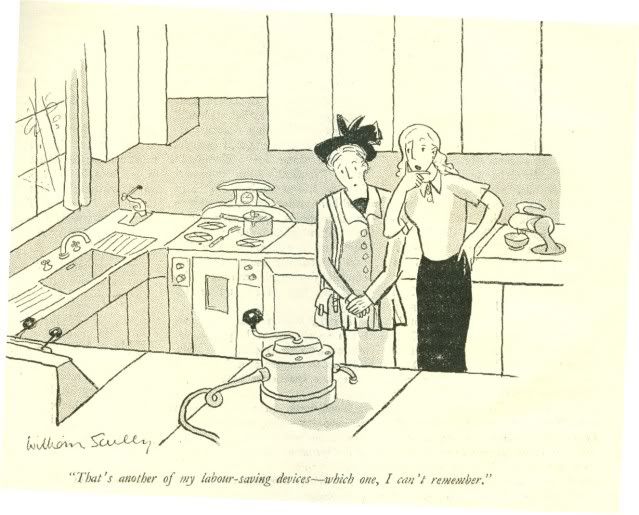
1949: Labour Saving Gadgets in the Kitchen
Here is another rare reference to consumerism in 1949. The cartoonist does not seem to favour these new fangled devices.
Such developments passed me by in 1949. I do however remember that in 1955 there was this craze for pressure cookers which were supposed to be a great boon because they save on the gas or the electricity. They are still available today though they don’t constitute a craze.
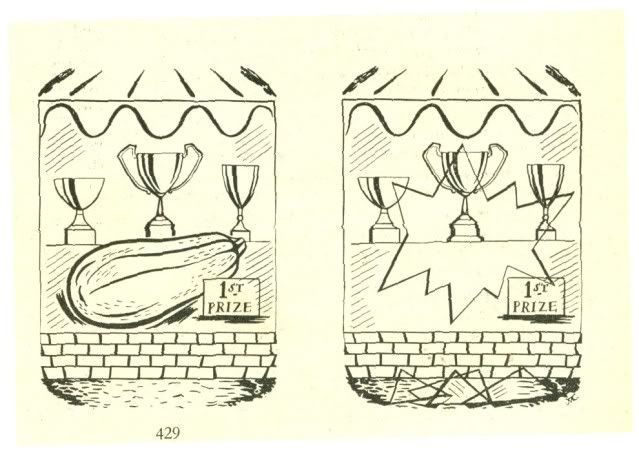
1949: A Matter of Priority
Wartime food rationing was still very much in force in 1949.
You can’t eat the silver cups. I didn’t feel badly fed at that time but the cartoonist is suggesting that we all did.
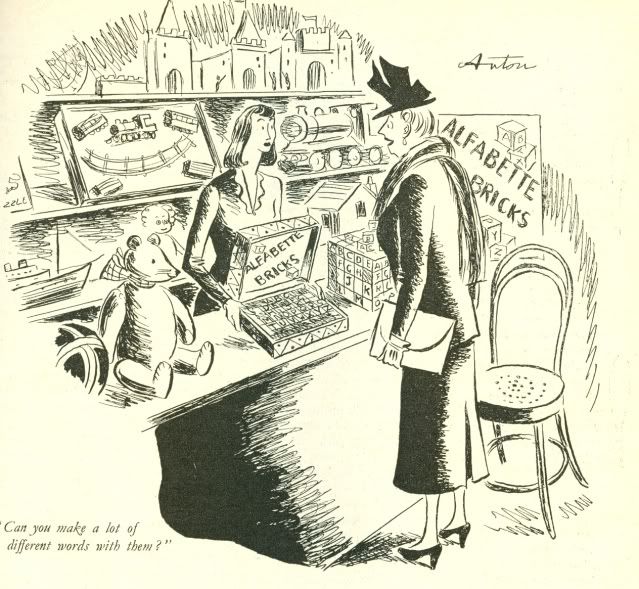
1949: The Shop Assistant’s Dilemma
How do you answer the customer’s question without revealing how stupid she is being?
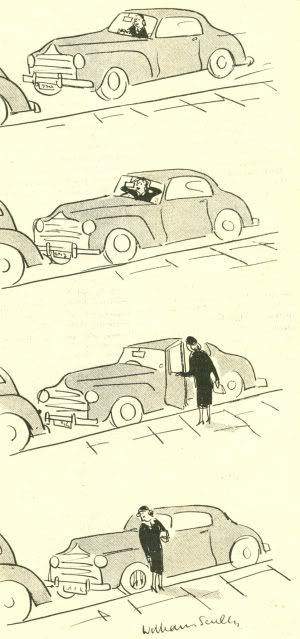
1949: Getting Added Value from Your Motor Car
This kind of ‘joke’ is no longer acceptable. Nevertheless it is a scene that is entirely plausible.
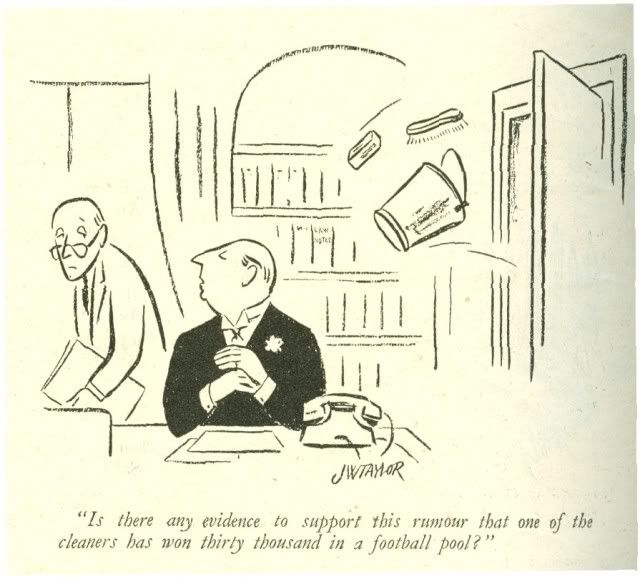
1949: An Illustration of the Effects of Inflation
A £30,000 windfall seems somewhat modest by today’s standards. However, a conversion site I have found calculates that £30,000 in 1949 would have equated to £946,875 in 2014.
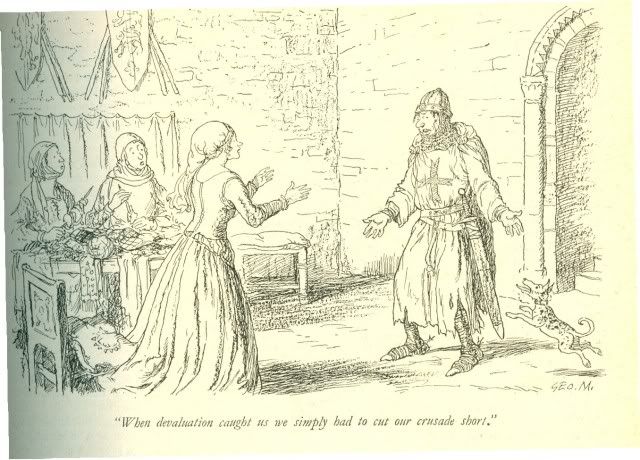
1949: Devaluation
This cartoonist usually imagines how a current situation would have played absurdly out in the past, such as Cleopatra having to cope with milk rationing.
In 1949 there was a 30% devaluation of the pound against the dollar. In reality this was not a problems faced by Crusaders.
Nowadays governments don’t revalue their currencies because the markets determine the rate of exchange.